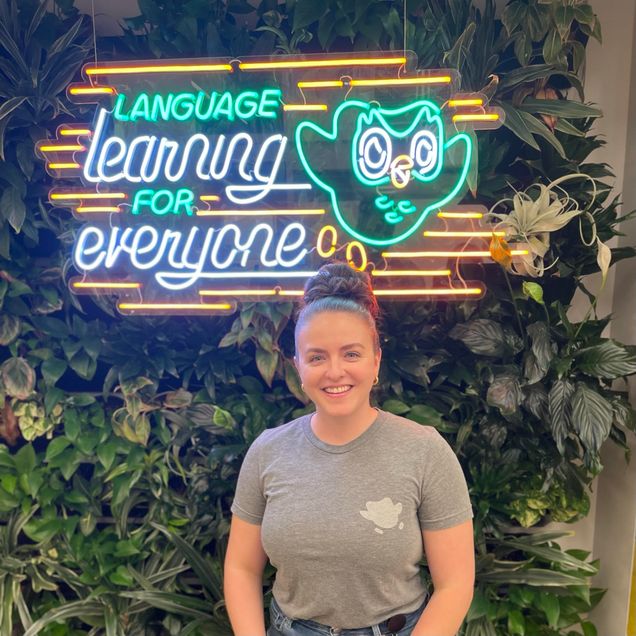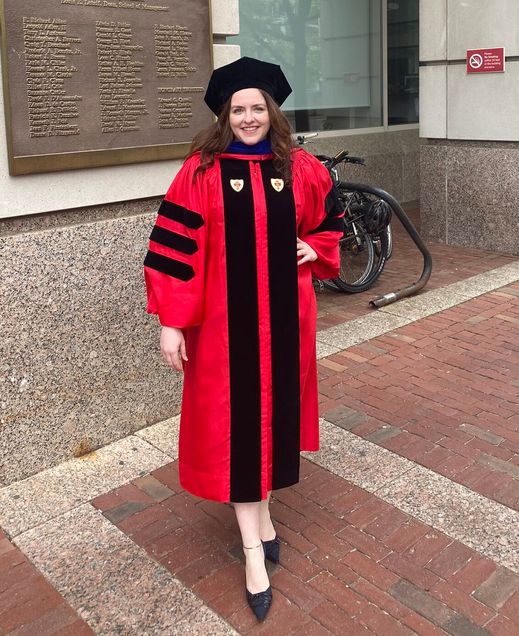Emilia Wisniewski (COM’25) with Katrina Scalise (COM’25)
Why is it hard to learn sounds in a new language? What will English be like 100 years from now? When it comes to language, who decides what’s “correct”? Is irregardless a word?
These are a few of the questions that Danielle Dionne (GRS ’23) has answered — in blog form — as a learning scientist at Duolingo, an educational technology company that creates learning apps and offers courses on over 40 languages.

At Duolingo, Dionne does research and data analysis to ensure that the Duolingo app teaches language learners in the best way possible. She also writes for the Duolingo blog, helping to explain complicated research and linguistic structure to the general public.
But until her senior undergraduate year, Dionne, who graduated from the Boston University Department of Linguistics in May, didn’t even know you could study languages. “During my time at Florida Atlantic University, I took an introduction to linguistics class as an elective and I fell in love with it,” said Dionne, who grew up surrounded by languages — including Canadian French at home and Portuguese, Spanish, Haitian Creole, and Jamaican Patois in her in south Florida neighborhood.
After earning a BA in education, Dionne continued on at Florida Atlantic University for a masters in Linguistics. Then she started exploring PhD programs, and discovered a brand new program in Boston University’s Linguistics Department. As someone who was fairly new to the field of linguistics, it seemed like the perfect fit.
“It seemed like the faculty were just as excited to have a new program and new PhD students in the department as I was to be a new PhD student,” she said.“That was one thing that really stuck with me and made me end up choosing BU.”
The BU Linguistics master’s and PhD programs launched in 2018, the same year Linguistics became a distinct department in CAS. Though linguistics courses had been offered at BU since the mid-1970s, it previously functioned as a program with faculty affiliates who were seated in departments across the college.
The linguistics minor was established in 1986, followed by the major in 1991. More recently, there have been joint undergraduate majors offerings, combining linguistics with Computer Science; Philosophy; Speech, Language, and Hearing Sciences; African Languages; French; Italian; Japanese and Spanish. The Linguistics Department also offers two graduate certificates, one targeted for graduate students from other programs within BU and one for students of all backgrounds looking to explore the field in greater depth.

Dionne started in the PhD program in Fall 2018 with just four other students in her cohort. And in May 2023 became the first student to graduate from the program.
“One of the things that I told Danielle’s cohort of students when they joined our department was that they were the pioneers, and that they were going to be the first to do every single thing in our department,” said her advisor, Associate Professor of Spanish and Linguistics Daniel Erker. “We really have relied on them over the past several years, to get a sense of how things seem to be going for them.”
Dionne is interested in how people use language on a daily basis and the variation in language. Her dissertation research focused on the effect of the usage of particular words on the structure of human languages. Specifically, she looked at the frequency of use of Spanish verbs as they relate to subject presence and absence. She conducted her research by joining two datasets of interviews with Spanish speakers in Boston and in New York collected by Erker 10 years earlier.
Dionne said she was intrigued by the unanswered questions and replications surrounding Erker’s study, and in her research found that verb frequency only affects pronoun use for extremely common words. “I am very interested in the way language use varies from speaker to speaker but also within a single speaker, and I am also interested in what variation can tell us about the cognitive aspects of language,” Dionne said. “Basically, ‘how does variation in language reflect the mental representation in language?’”
Dionne said being the first doctoral graduate “felt pretty overwhelming,” but she’s glad she had the opportunity to be part of the growing process. Because the department was new, Dionne felt that she and her classmates became true members of the department. Their feedback on job faculty candidates was considered during the department’s hiring process and she and her peers were involved in the programs like the BU Conference on Language Development and the Linguistics Graduate Research Forum.
“It was exciting to experience the growth in the department. And, throughout all of that growth, it was clear that the linguistics department really cared about each student and valued our opinions,” Dionne said. “My department was so flexible and willing to acknowledge, ‘hey, this is new for everybody, we’re all kind of figuring it out,’ that’s what I think made it great.”